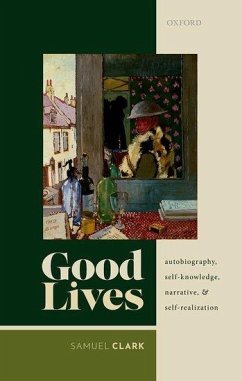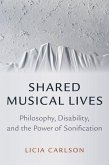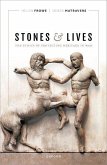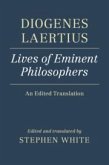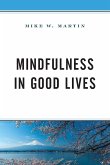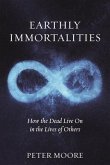- Gebundenes Buch
- Merkliste
- Auf die Merkliste
- Bewerten Bewerten
- Teilen
- Produkt teilen
- Produkterinnerung
- Produkterinnerung
Samuel Clark explores how we can learn about ourselves by reading, thinking through, and arguing about autobiography. He defends a self-realization account of the self and the good life, and argues that self-narration plays less role in our lives than some thinkers have supposed, and the development and expression of potential much more.
Andere Kunden interessierten sich auch für
![Shared Musical Lives Shared Musical Lives]() Licia CarlsonShared Musical Lives114,99 €
Licia CarlsonShared Musical Lives114,99 €![The Double Lives of Objects The Double Lives of Objects]() Thomas SattigThe Double Lives of Objects98,99 €
Thomas SattigThe Double Lives of Objects98,99 €![Stones and Lives Stones and Lives]() Helen FroweStones and Lives106,99 €
Helen FroweStones and Lives106,99 €![Diogenes Laertius: Lives of Eminent Philosophers Diogenes Laertius: Lives of Eminent Philosophers]() Diogenes Laertius: Lives of Eminent Philosophers179,99 €
Diogenes Laertius: Lives of Eminent Philosophers179,99 €![The Arc of Love: How Our Romantic Lives Change Over Time The Arc of Love: How Our Romantic Lives Change Over Time]() Aaron Ben-Ze'evThe Arc of Love: How Our Romantic Lives Change Over Time49,99 €
Aaron Ben-Ze'evThe Arc of Love: How Our Romantic Lives Change Over Time49,99 €![Mindfulness in Good Lives Mindfulness in Good Lives]() Mike W. MartinMindfulness in Good Lives49,99 €
Mike W. MartinMindfulness in Good Lives49,99 €![Earthly Immortalities: How the Dead Live on in the Lives of Others Earthly Immortalities: How the Dead Live on in the Lives of Others]() Peter MooreEarthly Immortalities: How the Dead Live on in the Lives of Others24,99 €
Peter MooreEarthly Immortalities: How the Dead Live on in the Lives of Others24,99 €-
-
-
Samuel Clark explores how we can learn about ourselves by reading, thinking through, and arguing about autobiography. He defends a self-realization account of the self and the good life, and argues that self-narration plays less role in our lives than some thinkers have supposed, and the development and expression of potential much more.
Hinweis: Dieser Artikel kann nur an eine deutsche Lieferadresse ausgeliefert werden.
Hinweis: Dieser Artikel kann nur an eine deutsche Lieferadresse ausgeliefert werden.
Produktdetails
- Produktdetails
- Verlag: Hurst & Co.
- Seitenzahl: 272
- Erscheinungstermin: 4. Mai 2021
- Englisch
- Abmessung: 218mm x 145mm x 25mm
- Gewicht: 476g
- ISBN-13: 9780198865384
- ISBN-10: 0198865384
- Artikelnr.: 60886959
- Herstellerkennzeichnung
- Libri GmbH
- Europaallee 1
- 36244 Bad Hersfeld
- 06621 890
- Verlag: Hurst & Co.
- Seitenzahl: 272
- Erscheinungstermin: 4. Mai 2021
- Englisch
- Abmessung: 218mm x 145mm x 25mm
- Gewicht: 476g
- ISBN-13: 9780198865384
- ISBN-10: 0198865384
- Artikelnr.: 60886959
- Herstellerkennzeichnung
- Libri GmbH
- Europaallee 1
- 36244 Bad Hersfeld
- 06621 890
Samuel Clark is Senior Lecturer in Philosophy, Department of Politics, Philosophy, and Religion at Lancaster University.
1. Introduction
Part I
2. Routemap 1: Autobiography
3. Autobiography is Recollection
4. Autobiography is Reflection on Experience
5. Autobiography is Artefactual
6. Autobiography is a Genre
7. Autobiography is Narrative
8. Paradigm Autobiographical Form
9. Autobiography is a Local Tradition
10. Rationalism about Autobiography
11. Autobiography as Clue and as Container
12. Autobiography as Historical Data
13. Autobiography as Thought Experiment
14. Form enables Reasoning
15. Particular Reasoning
16. Diachronic Reasoning
17. Compositional Reasoning
18. Objection: Autobiographies are Novels
19. Self-reflective reasoning
20. Horizontal Connection not Vertical Generalization
21. Routemap 2: Uses of Autobiography
22. Two Purposes of Autobiography
23. The Delphic Demand
24. Explanation
25. Justification and Self-enjoyment
26. Selfhood
27. Good life
28. Reductionism about Meaning
29. Accounts of the Self
30. Taxonomies of the Self
31. Tasks for an Account of the Self
32. Accounts of the Good Life
33. Taxonomies of the Good Life
34. Tasks for an Account of the Good Life
35. The Self and its Good
36. Self-realization
37. Ethical Objections to Self-realization
38. Metaphysics of the Realizable Self
39. An Epistemological Objection to Self-realization
40. Experiential Objections to Self-realization
41. Routemap 3: from Part I to Part II
Part II
42. Narrativist Views
43. Routemap 4: The Dialectic between Narrative and Self-realization
44. Siegfried Sassoon s Memoirs
45. The Shape of a Life
46. Narrative Non-additivity
47. Non-narrative Explanations of Non-additivity
48. Neither Agents nor Temporal Sequences Explain Non-additivity
49. Telling does not Explain Non-additivity
50. Genre does not Explain Non-additivity
51. Self-realization Explains Non-additivity
52. Narrative Self-unification
53. Irony vs Rosati
54. Transformative Experience vs Schechtman
55. Against Narrative Self-unification
56. For Self-realization over a Life
57. Objection: The Self is a Self-interpretation
58. First Reply: Self vs Persona
59. Second Reply: Pluralist realism about Self-knowledge
60. Introspection is a Bad Method of Self-discovery
61. The Objective Stance is an Incomplete Method of Self-discovery
62. Pleasure as Self-discovery
63. John Stuart Mill s Autobiography
64. Edmund Gosse s Father and Son
65. Lessons from Mill and Gosse
66. Asceticism
67. Enlistment as Self-discovery
68. Solitude as Self-discovery
69. Asceticism as Self-discovery
70. Pluralist Realism about Self-knowledge
71. Self-knowledge and Self-realization
72. Autobiography and Self-knowledge
73. Routemap 5: Against Narrative, for Self-realization
74. Objection: What about You?
Works Cited
Index
Part I
2. Routemap 1: Autobiography
3. Autobiography is Recollection
4. Autobiography is Reflection on Experience
5. Autobiography is Artefactual
6. Autobiography is a Genre
7. Autobiography is Narrative
8. Paradigm Autobiographical Form
9. Autobiography is a Local Tradition
10. Rationalism about Autobiography
11. Autobiography as Clue and as Container
12. Autobiography as Historical Data
13. Autobiography as Thought Experiment
14. Form enables Reasoning
15. Particular Reasoning
16. Diachronic Reasoning
17. Compositional Reasoning
18. Objection: Autobiographies are Novels
19. Self-reflective reasoning
20. Horizontal Connection not Vertical Generalization
21. Routemap 2: Uses of Autobiography
22. Two Purposes of Autobiography
23. The Delphic Demand
24. Explanation
25. Justification and Self-enjoyment
26. Selfhood
27. Good life
28. Reductionism about Meaning
29. Accounts of the Self
30. Taxonomies of the Self
31. Tasks for an Account of the Self
32. Accounts of the Good Life
33. Taxonomies of the Good Life
34. Tasks for an Account of the Good Life
35. The Self and its Good
36. Self-realization
37. Ethical Objections to Self-realization
38. Metaphysics of the Realizable Self
39. An Epistemological Objection to Self-realization
40. Experiential Objections to Self-realization
41. Routemap 3: from Part I to Part II
Part II
42. Narrativist Views
43. Routemap 4: The Dialectic between Narrative and Self-realization
44. Siegfried Sassoon s Memoirs
45. The Shape of a Life
46. Narrative Non-additivity
47. Non-narrative Explanations of Non-additivity
48. Neither Agents nor Temporal Sequences Explain Non-additivity
49. Telling does not Explain Non-additivity
50. Genre does not Explain Non-additivity
51. Self-realization Explains Non-additivity
52. Narrative Self-unification
53. Irony vs Rosati
54. Transformative Experience vs Schechtman
55. Against Narrative Self-unification
56. For Self-realization over a Life
57. Objection: The Self is a Self-interpretation
58. First Reply: Self vs Persona
59. Second Reply: Pluralist realism about Self-knowledge
60. Introspection is a Bad Method of Self-discovery
61. The Objective Stance is an Incomplete Method of Self-discovery
62. Pleasure as Self-discovery
63. John Stuart Mill s Autobiography
64. Edmund Gosse s Father and Son
65. Lessons from Mill and Gosse
66. Asceticism
67. Enlistment as Self-discovery
68. Solitude as Self-discovery
69. Asceticism as Self-discovery
70. Pluralist Realism about Self-knowledge
71. Self-knowledge and Self-realization
72. Autobiography and Self-knowledge
73. Routemap 5: Against Narrative, for Self-realization
74. Objection: What about You?
Works Cited
Index
1. Introduction
Part I
2. Routemap 1: Autobiography
3. Autobiography is Recollection
4. Autobiography is Reflection on Experience
5. Autobiography is Artefactual
6. Autobiography is a Genre
7. Autobiography is Narrative
8. Paradigm Autobiographical Form
9. Autobiography is a Local Tradition
10. Rationalism about Autobiography
11. Autobiography as Clue and as Container
12. Autobiography as Historical Data
13. Autobiography as Thought Experiment
14. Form enables Reasoning
15. Particular Reasoning
16. Diachronic Reasoning
17. Compositional Reasoning
18. Objection: Autobiographies are Novels
19. Self-reflective reasoning
20. Horizontal Connection not Vertical Generalization
21. Routemap 2: Uses of Autobiography
22. Two Purposes of Autobiography
23. The Delphic Demand
24. Explanation
25. Justification and Self-enjoyment
26. Selfhood
27. Good life
28. Reductionism about Meaning
29. Accounts of the Self
30. Taxonomies of the Self
31. Tasks for an Account of the Self
32. Accounts of the Good Life
33. Taxonomies of the Good Life
34. Tasks for an Account of the Good Life
35. The Self and its Good
36. Self-realization
37. Ethical Objections to Self-realization
38. Metaphysics of the Realizable Self
39. An Epistemological Objection to Self-realization
40. Experiential Objections to Self-realization
41. Routemap 3: from Part I to Part II
Part II
42. Narrativist Views
43. Routemap 4: The Dialectic between Narrative and Self-realization
44. Siegfried Sassoon s Memoirs
45. The Shape of a Life
46. Narrative Non-additivity
47. Non-narrative Explanations of Non-additivity
48. Neither Agents nor Temporal Sequences Explain Non-additivity
49. Telling does not Explain Non-additivity
50. Genre does not Explain Non-additivity
51. Self-realization Explains Non-additivity
52. Narrative Self-unification
53. Irony vs Rosati
54. Transformative Experience vs Schechtman
55. Against Narrative Self-unification
56. For Self-realization over a Life
57. Objection: The Self is a Self-interpretation
58. First Reply: Self vs Persona
59. Second Reply: Pluralist realism about Self-knowledge
60. Introspection is a Bad Method of Self-discovery
61. The Objective Stance is an Incomplete Method of Self-discovery
62. Pleasure as Self-discovery
63. John Stuart Mill s Autobiography
64. Edmund Gosse s Father and Son
65. Lessons from Mill and Gosse
66. Asceticism
67. Enlistment as Self-discovery
68. Solitude as Self-discovery
69. Asceticism as Self-discovery
70. Pluralist Realism about Self-knowledge
71. Self-knowledge and Self-realization
72. Autobiography and Self-knowledge
73. Routemap 5: Against Narrative, for Self-realization
74. Objection: What about You?
Works Cited
Index
Part I
2. Routemap 1: Autobiography
3. Autobiography is Recollection
4. Autobiography is Reflection on Experience
5. Autobiography is Artefactual
6. Autobiography is a Genre
7. Autobiography is Narrative
8. Paradigm Autobiographical Form
9. Autobiography is a Local Tradition
10. Rationalism about Autobiography
11. Autobiography as Clue and as Container
12. Autobiography as Historical Data
13. Autobiography as Thought Experiment
14. Form enables Reasoning
15. Particular Reasoning
16. Diachronic Reasoning
17. Compositional Reasoning
18. Objection: Autobiographies are Novels
19. Self-reflective reasoning
20. Horizontal Connection not Vertical Generalization
21. Routemap 2: Uses of Autobiography
22. Two Purposes of Autobiography
23. The Delphic Demand
24. Explanation
25. Justification and Self-enjoyment
26. Selfhood
27. Good life
28. Reductionism about Meaning
29. Accounts of the Self
30. Taxonomies of the Self
31. Tasks for an Account of the Self
32. Accounts of the Good Life
33. Taxonomies of the Good Life
34. Tasks for an Account of the Good Life
35. The Self and its Good
36. Self-realization
37. Ethical Objections to Self-realization
38. Metaphysics of the Realizable Self
39. An Epistemological Objection to Self-realization
40. Experiential Objections to Self-realization
41. Routemap 3: from Part I to Part II
Part II
42. Narrativist Views
43. Routemap 4: The Dialectic between Narrative and Self-realization
44. Siegfried Sassoon s Memoirs
45. The Shape of a Life
46. Narrative Non-additivity
47. Non-narrative Explanations of Non-additivity
48. Neither Agents nor Temporal Sequences Explain Non-additivity
49. Telling does not Explain Non-additivity
50. Genre does not Explain Non-additivity
51. Self-realization Explains Non-additivity
52. Narrative Self-unification
53. Irony vs Rosati
54. Transformative Experience vs Schechtman
55. Against Narrative Self-unification
56. For Self-realization over a Life
57. Objection: The Self is a Self-interpretation
58. First Reply: Self vs Persona
59. Second Reply: Pluralist realism about Self-knowledge
60. Introspection is a Bad Method of Self-discovery
61. The Objective Stance is an Incomplete Method of Self-discovery
62. Pleasure as Self-discovery
63. John Stuart Mill s Autobiography
64. Edmund Gosse s Father and Son
65. Lessons from Mill and Gosse
66. Asceticism
67. Enlistment as Self-discovery
68. Solitude as Self-discovery
69. Asceticism as Self-discovery
70. Pluralist Realism about Self-knowledge
71. Self-knowledge and Self-realization
72. Autobiography and Self-knowledge
73. Routemap 5: Against Narrative, for Self-realization
74. Objection: What about You?
Works Cited
Index

